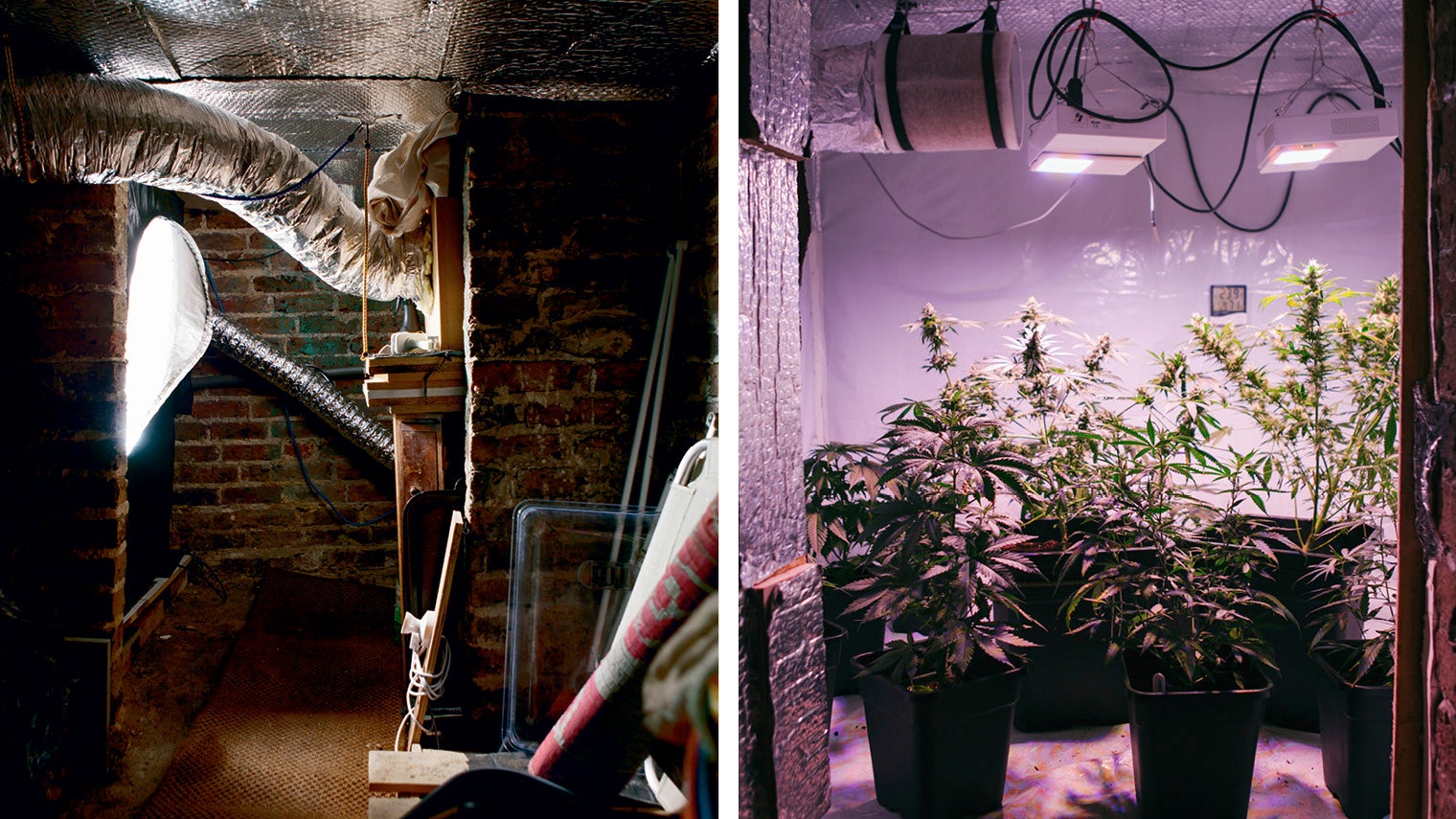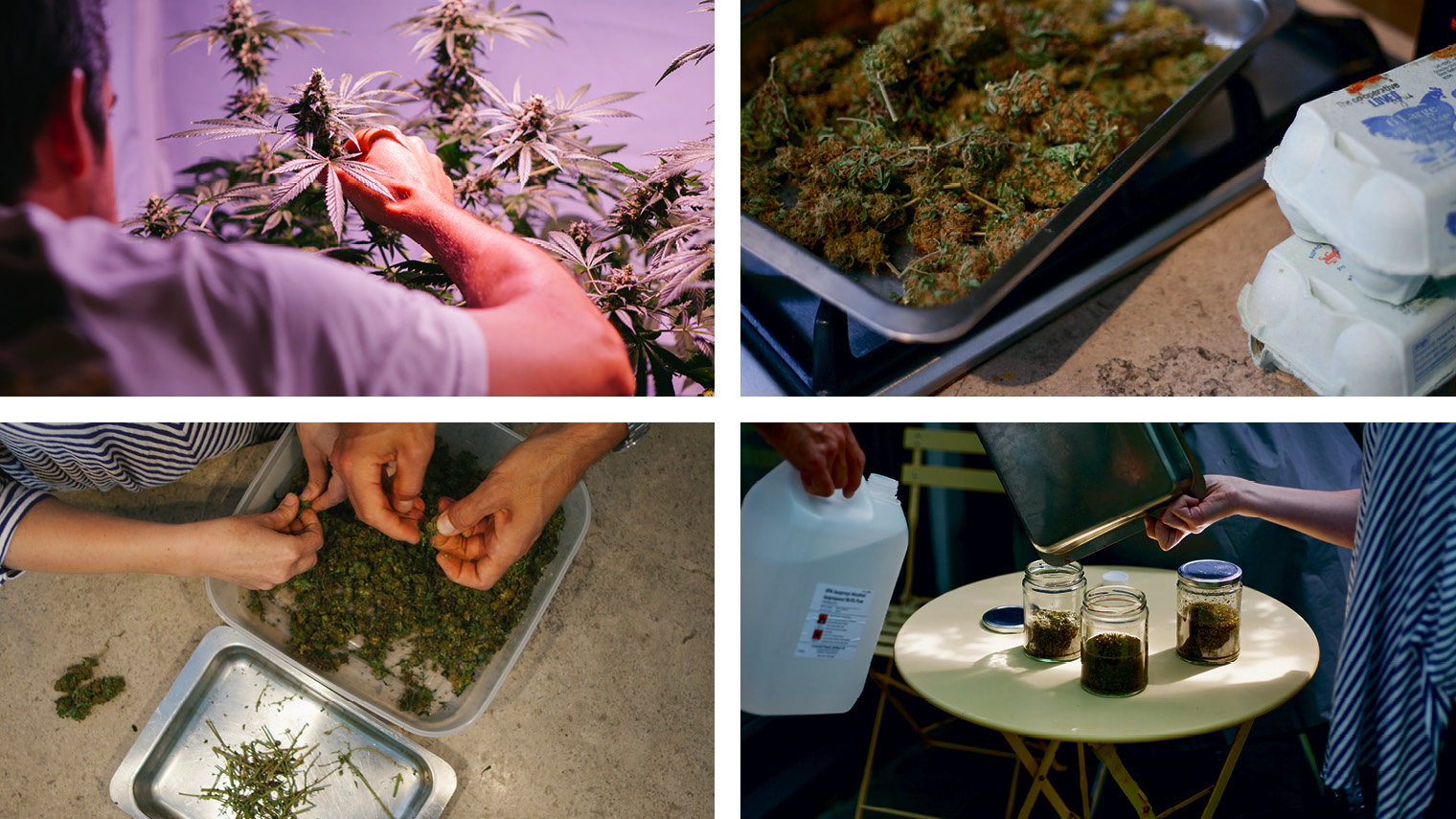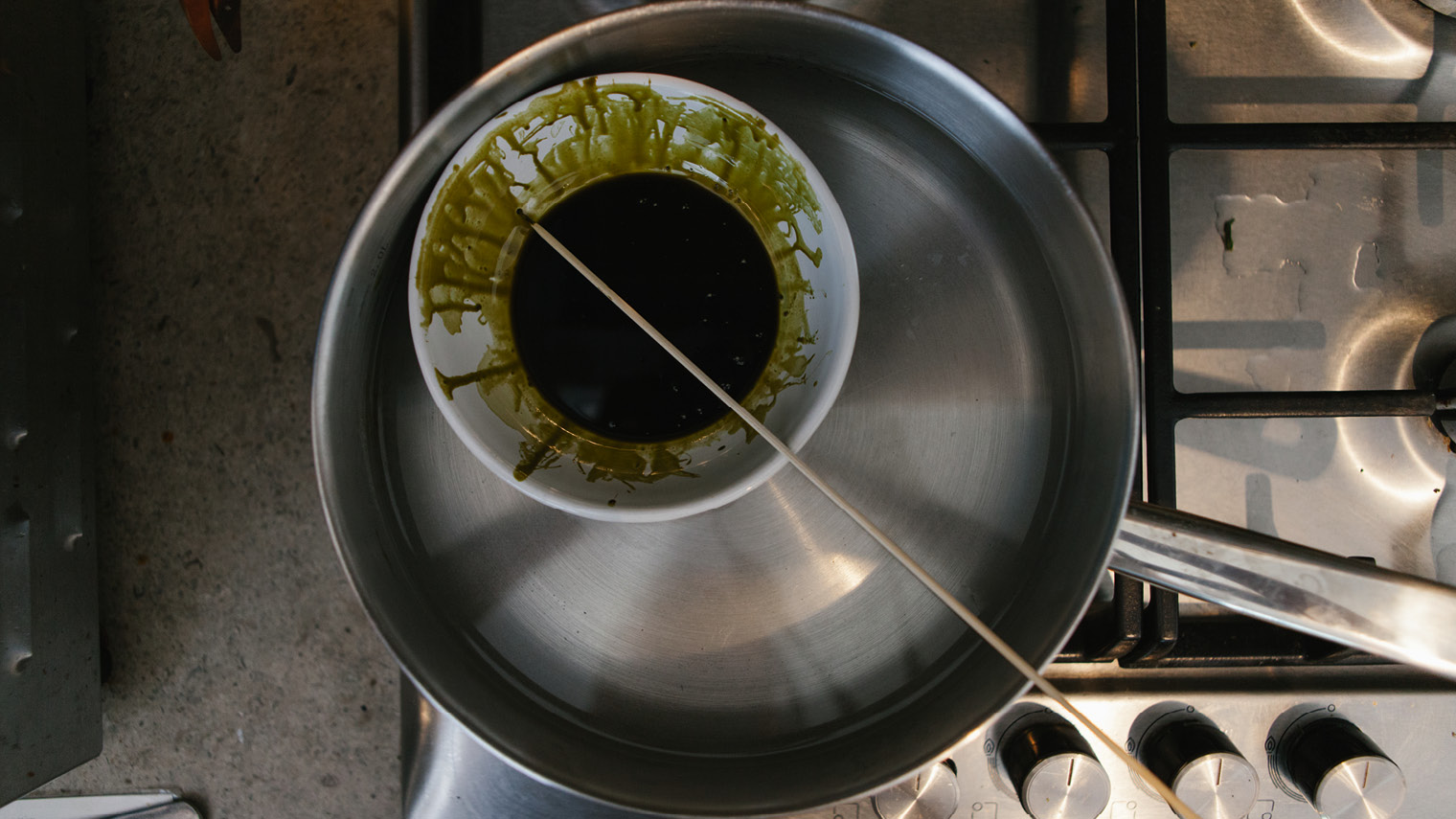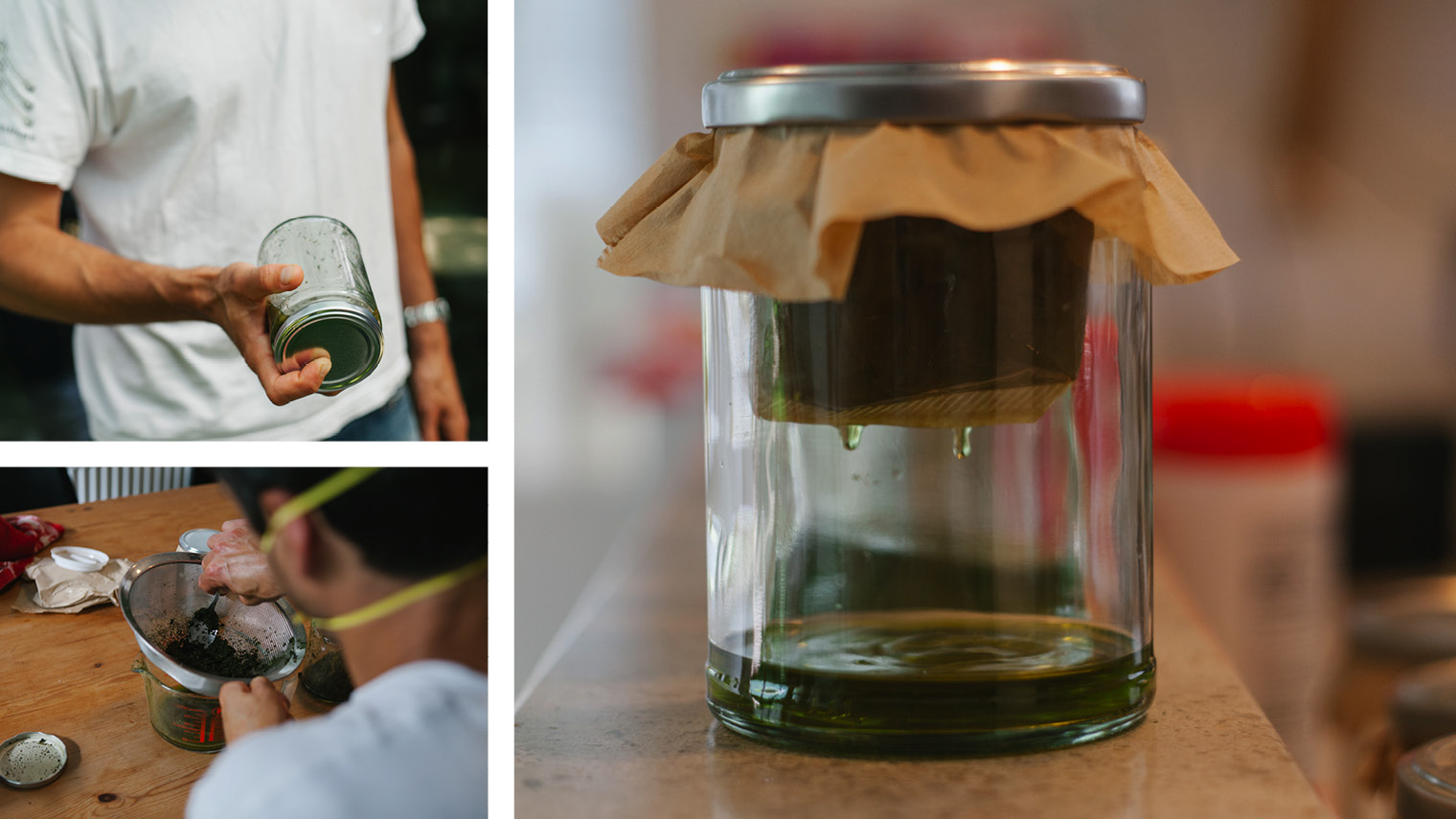Photography: Joseph Fox
In a kitchen in a Victorian house in a seaside commuter town, a husband and wife in their late thirties are trying out a new recipe. Baking trays filled with home-grown vegetables are stacked in the oven, while a bowl of green leaves soak before juicing. Specially purchased ingredients jostle for space with bottles of balsamic vinegar and toasted sesame oil on the crowded work surface. Unbleached coffee filters perch on glass Kilner jars in readiness for the next stage of the process.
This could be a typical scene from middle-class domestic life, were it not for the sickly odour emanating from the oven, the acrid fumes drifting from a jerry can of isopropyl alcohol and the fact that everyone’s voices are muffled by the industrial breathing masks that they’re wearing. Despite the afternoon heat, the blinds and windows are firmly closed against curious neighbours.
Currently undergoing chemotherapy for stage 4 bowel cancer with metastasis in the liver, lymph nodes and lung, Philippa and her husband Craig are among an estimated 30,000 people in the UK who are self-medicating with cannabis oil. Unable to find an affordable or trustworthy source, they are producing it themselves, despite the risk of a potential jail term of up to 14 years. In their corner are an unlikely alliance of doctors, scientists, patient support groups, lords, baronesses and dealers, united in the belief that severely ill patients are being denied access to a substance that could transform their lives.
The two people carefully poring over their copy of Mel Thomas’ Cannabis Cultivation are otherwise law-abiding, hard-working professionals and parents, whose lives have been derailed by an awful twist of medical fate, leaving them — they believe — with no option but to break the law.
“The one thing it’s given me – and the most important thing it’s given me – is hope,” says Philippa as the green liquid starts to slowly drip through the coffee filters into lines of jars.

Philippa and Craig’s seaside joint
A long heritage
In Chinese medicine, cannabis is listed as one of the 50 ‘fundamental herbs’, used to treat conditions including gout and rheumatism. The Lancet from 1890 records that a widely available cannabis tincture was prescribed to Queen Victoria during labour.
However, cannabis’ official role in British medicine effectively ground to a halt with the 1925 Dangerous Drugs Act. Later legislation individually tackled the emerging recreational use of amphetamines and LSD, with the 1971 Misuse of Drugs Act rationalising the previous laws.
Some loosening of the law on cannabis was mooted in the late 1990s, but progress ended with the Misuse of Drugs Regulations in 2001, which classed cannabis as a Schedule 1 drug. In basic terms this deems the plant to be harmful but with limited medicinal value, ranking it alongside LSD. These designations make it extremely difficult for scientists to conduct medical research using cannabis.
Until 1963, when Israeli chemist Raphael Mechoulam began to chemically ‘unpack’ a sample of Lebanese hashish, no serious attempt had been made to find out what individual compounds could be derived from the plant.
Mechoulam’s principal discoveries were tetrahydrocannabinol (THC) and cannabidiol (CBD). The former got users high, while the latter had no psychoactive effects, but both had promising medical potential. To this day, Israel has a progressive attitude to medical cannabis, with upwards of 20,000 patients licensed to use it for everything from glaucoma to Tourette’s syndrome. Studies elsewhere have led to it being used for pain management, muscle spasms, multiple sclerosis, neuropathic pain, the nausea and weight loss caused by cancer or AIDS, Parkinson’s disease, glaucoma and the side effects of chemotherapy.
In the UK the law is more complicated. Cannabis remains a class B drug, having briefly been downgraded to class C between 2004 and 2008. A mixture of THC and CBD is available as a spray called Sativex, authorised for use only for MS-related spasticity. The National Institute for Health and Care Excellence, the gatekeeper responsible for approving treatments available on the NHS, has designated it ‘not a cost-effective treatment’.
In Wales, however, it is funded for patients with MS. Synthetic forms of THC are marketed as Dronabinol and Nabilone: Nabilone has been licensed since 1982 for prescribed use in hospitals, but is rarely administered; Dronabinol is classed as a Schedule 2 drug so it has a recognised medical use and can be prescribed, but has never been licensed.
[embed_related]
This legal tangle has created a Kafka-esque environment for patients. Their most outspoken advocate has been Clark French, who founded the United Patients Alliance – a support and lobbying group – after being diagnosed with MS in 2010, while a 24-year-old student.
“My legs stopped working, basically,” he says. “I was in tremendous amounts of pain. It completely destroyed my life.”
Having noticed that recreational cannabis use lessened his symptoms, he graduated and used what remained of his savings to travel to California, where he took an intensive course of oil. While not cured, “the frequency of the bad days became much less. I could get some of my life back”.
Clark is currently not using this oil, as there is no legal route to get it in the UK. His anger at the predicament of his fellow patients is palpable.
“It’s heartbreaking to hear of people who are going through really serious illnesses and being worried that they’re going to get ripped off. Ordinary people are having to deal with hardened criminals, who don’t care if you’re well or not. I can’t understand why the government would allow that.”

Cannabis buds are picked, dried out, stripped and placed in jars to soak in solvent
Psychological support
“When I was diagnosed with bowel cancer almost two years ago, I hit Google, which is generally what everyone does.”
Philippa has removed her breathing mask, and is sat on a sofa by the French windows of her house. On the other side of the glass, a rice cooker is burning off the solvent from the cannabis oil, heating it into a thick reduction. Smoke spools around the top, prickling the nostrils with a smell like industrial-strength baby wipes.
“There’s about a million things that everyone is saying will cure cancer. But cannabis oil kept cropping up and had a lot of good research behind it,” she says.
Having first bought oil from a stranger recommended by another patient, she now suspects that she was being sold worthless hemp oil, as a switch in suppliers saw the same dose having a much greater impact.
A regular dose for a patient like Philippa would be around a gram of oil a day, costing between £30-£50 each time. Usually, the genuine oil has little psychoactive effect, as she takes it in suppository form, with a small additional dose taken orally before bed. While still at stage 4, her tumour markers have recently dropped to by far their lowest point since diagnosis — far lower than expected — but the psychological impacts have been perhaps more profound.
“I was destroyed by my diagnosis, absolutely mentally destroyed,” she says bluntly. “It probably took me a good five months to recover from that. I lost my mind completely. I was severely depressed, psychotic, I wanted them to give me ECT, just do something to my brain to fix it because it felt broken. But when I discovered cannabis oil was when my hope returned, because I saw amazing stories of it working for people.”
Official bodies are cautious. Cancer Research UK and the Royal Marsden declined to discuss the medical use of cannabis, beyond material and prepared statements that they have previously issued on their websites.
Speaking anonymously, one senior oncologist said that his patients who were using cannabis tended to be open with him about it and while emphasising that it would not work for everyone, saying: “If they think it helps in terms of their symptoms, then I have no personal objection. I’m open-minded about it.”
Change, if it comes, will be slow and hard-won. Perfecting a new drug is a huge undertaking. The Royal Pharmaceutical Society estimates that the average development takes ten years and costs £1 billion. Law-and-order politicians retain a hard stance on the drug, and society is still largely unaware of the behind-the-scenes fight for ‘rescheduling’ of cannabis. Even so, there are some within the political establishment backing a relaxation of the law on research.
Cannabis-based medication ought to be consistently available to patients in need across this country. It’s wrong that it’s not and it’s inhumane that it’s not
On a hot afternoon in high summer, in the House of Lords tea room, Baroness Meacher of Spitalfields outlines the potential beneficiaries of legal medical cannabis — from children with dravet syndrome to pensioners with Alzheimer’s. It is vital, she says, that the debate be separated from the wider campaign to legalise recreational drugs.
“These are certainly not people who are looking for a high,” she says.
Meacher — who spent much of her career working in social services and mental health, and has sat as a crossbench peer since 2006 — has recently published a research report and asked questions in the House of Lords about medical cannabis. Her main argument is that the drug should be rescheduled to enable doctors to prescribe it to patients who need it. Moving cannabis to a Schedule 2 drug would facilitate research, she says. Moving responsibility for drug policy from the Home Office to the Department of Health would also set a more constructive tone for the debate.
Meacher also wants an independent review of the Misuse of Drugs Act. “It’s not that I want everything legalised,” she says. “I’m not radical in that sense. But we need to say: ‘are there things we could do better?’”
Lord Howarth of the All Party Parliamentary Group for Drug Policy Reform agrees. “In the end, the bar of good arguments wins. The problem is dealing with prejudice,” he says.
“What I suspect is that ministers haven’t really applied their minds. They’re running scared of tabloids, of public opinion and think that they’ll be accused of being soft on drug use. But cannabis-based medication ought to be consistently available to patients in need across this country. It’s wrong that it’s not and it’s inhumane that it’s not.”
Ultimately, the debate may come down to whether or not anyone can prove that cannabinoids actually work.

The finished oil is heated to purge the last remnants of solvent
The science
Wai Liu’s laboratory in St George’s, University of London is unglamorous, filled with teetering piles of paperwork and folders. In the corner his assistant quietly works on a hugely complicated computer model.
“In November 2014, we had a paper out,” Liu says. “What we focused on were mice in a lab-based study. We essentially looked at the effect that cannabinoids — THC and CBD — had in combination with radiation. If you use the radiation on its own, you get some tumour reduction.
The cannabinoid alone — again some reduction. But use the two together and you get a drastic decrease where the tumour virtually disappears.”
Liu’s theory is that the cannabinoids are somehow priming the tumour to make it more receptive to radiation. “It’s like a pathfinder,” he explains. “The cannabinoids go in up front and the way they work is that they tweak the cell signalling system, soften up those cells and make the radiation much more effective.”
Research in 2014 at the University of East Anglia came to a similar conclusion, with that year’s Handbook of Cannabis journal noting: “recent observations suggest that the combined administration of cannabinoids with other anti-cancer drugs acts synergistically to reduce tumour growth.”
Liu was first drawn to researching cannabinoids after completing his PhD at St Bartholomew’s Hospital. “I specifically wanted to look at drugs which were already out there which may have an anti-cancer effect. So I said to all these consultants: ‘if you see anything weird, let me know and I’ll look into it’.”
To conduct his experiments — which Liu describes as “fairly straightforwards” — he had to jump through six months of Home Office hoops. His enthusiasm for his work is palpable, but he speaks in the guarded, disclaimer-laden language of someone who is conscious that whatever he says is going to be pored over by patients who are often desperate for not just information, but also hope.
“I get e-mails and phone calls every day: ‘should I be taking cannabis oil?’ I tend to give them information and answer specific questions,” he says. “It’s important to stress to people that cannabinoids do not equal cannabis.”
Liu says that some of the data from his research does support the theory that THC and CBD, in combination with other therapies, can reduce tumour growth. The problem is, some data suggests the opposite.
“The last thing I want to see is someone taking cannabis that interferes with other drugs causing an increase in tumour growth,” he says. “That’s why I don’t like telling people to go ahead and use it because if it does go wrong it’s something that could have been averted.”
The effect of cannabis — as with all drugs — varies wildly depending on the purity, the make-up and the strength of the dose. And for people who are self-medicating under non-laboratory conditions, it is hugely difficult to work these things out. More research is needed, but that research will take years. As Liu knows as well as anyone, for patients dealing with these kinds of illnesses, no commodity is more strictly rationed than time itself.
The pace of legislative change is glacially slow. The last government made it clear that it had no plans to soften its stance. With the law effectively where it was in 1971, the British public is increasingly finding ways to work around it — and finding people willing to help them.

Shaking, straining and filtering the mixture
LULU AND FRANK
Back in the terraced house on the south coast, Philippa and Craig’s first batch of oil is almost complete. Having been dried out, washed in solvent, repeatedly filtered and boiled off in a rice cooker, the thick treacle-like liquid is warming in a bowl that floats in a pan of water on the hob. The final, tiny bubbles of solvent evaporating from the gloop. Below the house, hidden away behind a secret panel and surrounded by old bikes, buggies and a lawnmower, their collection of plants that will soon produce the next batch flutter gently under fans and LED lights.
“It just desperately needs to be researched,” says Philippa. “And while it’s Schedule 1 that makes it impossible for people.”
There’s an absolutely massive black market of people ripping other people off. There are people who are spending hundreds and thousands of pounds on olive oil, and dying as a result. It’s a travesty
Everyone in the supply chain is aware that they are flirting with jail time; all believe it is worth the risk.
“Philippa had been ripped off previously. So she contacted me in absolute desperation and not knowing who to trust,” Lulu says, sitting in a quiet corner of a gentrified suburban pub. “And she’s so young, she’s got kids. Of course we were going to help.”
Lulu, along with her partner Frank, have become a vital part of the shadow distribution network that helps Philippa and people like her to secure the supplies they need to make their own cannabis oil. By the letter of the law, they are engaged in the cultivation and distribution of a class B drug.
“There’s an absolutely massive black market of people ripping other people off. There are people who are spending hundreds and thousands of pounds on olive oil, and dying as a result. It’s a travesty,” Lulu says.
Both Lulu and Frank hold down regular jobs, and first explored medical cannabis after Lulu’s mother developed peritoneal cancer and was “told to sort her affairs out”. Lulu learned how to make the oil and gave it to her mother alongside her chemotherapy. “The oil seemed to work straight away”, she recalls.
“Her appetite came back, she started sleeping again, just started becoming herself again as she came off the morphine.”
Her mother’s tumour markers apparently dropped to a point where surgery was possible, she refused the second half of her chemotherapy and has just had her one-year all-clear. Having published her mother’s testimony on Facebook, Lulu began to be contacted by other patients keen to try cannabis oil, but with no idea of where or how to procure it. Both are adamant that they make no money beyond covering their overheads and the ad-hoc nature of the operation is apparent.
“I’m having to revolve around various people’s kitchens right now. The stuff I use is just stuff you get on Amazon, I haven’t got a swishy lab somewhere,” she says.
Until full testing and controlled trials can be carried out, the use of cannabis oil as medication is necessarily going to be founded on a mixture of self-observation, hope and conviction. For those facing potentially terminal illnesses, the hope it offers is worth every risk, even when their diseases overcome them.
“There’s a massive difference between a good death and a bad death,” says Lulu. “Of the few people we have taken on, the ones who haven’t made it, it’s still taken away the pain and fear. It allows you to eat properly and sleep properly. And that in itself is a success.”

A long heritage




